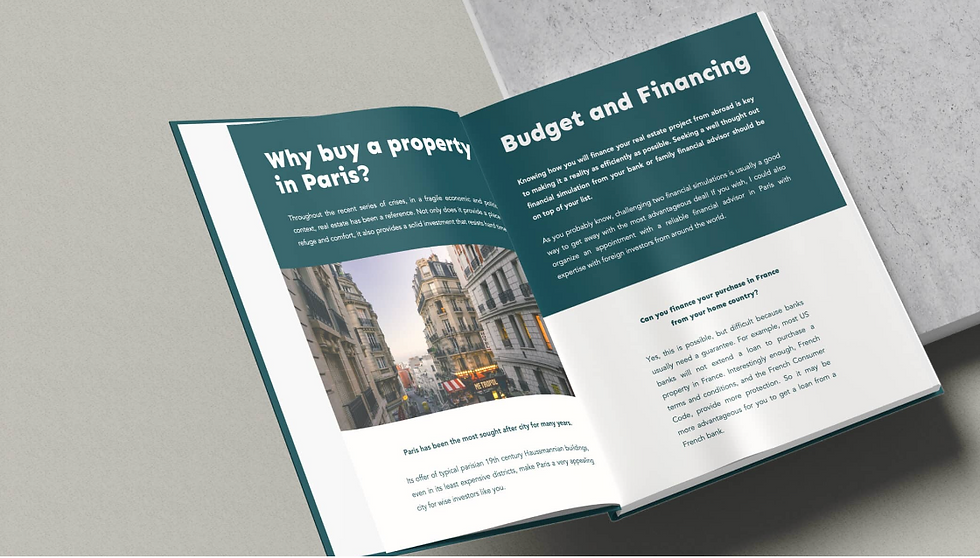FAQ: Financing your Parisian Home for Foreign Buyers
- Apr 23, 2024
- 3 min read
Updated: May 7, 2024
If you are contemplating buying a home in Paris from America, Australia or elsewhere, it can be intimidating to navigate the loan process, but it is not impossible with the right guidance.
Here are common questions regarding financing the purchase of property in Paris.

🥐 Do French Banks Extend Loans to Non-Resident and Foreign Buyers?
Yes! French banks and other mortgage lenders are typically willing to lend 60% of the property’s value (the LTV rate) with the proviso that a personal deposit of at least 40% of the total amount of the transaction (including notary fees as well as bank or brokerage fees) be placed in a savings account.
Your income influences the amount you can borrow. The legal requirement for French mortgages is that your total monthly liabilities – including mortgages and insurance – must be no more than 35% of your gross monthly household income.
French mortgages are usually only available with a property purchase agreement. However, you can sometimes secure a certificate of commitment (lettre de confort) from a mortgage lender, which lasts three or four months. These letters aren’t contractually binding but can reassure the seller that you’re a serious buyer.
🥐 Do I Need a Bank Account in France Before Buying a Property?
No, it is not essential to have a bank account in France before looking for a loan. Once you accept a loan offer, you will open at least one account with the selected bank so that the monthly loan repayments can be debited from it.
Please note that even though you do not need to have an account in France before receiving a loan offer, you must make sure you can easily transfer your deposit into a French account.

🥐 Can I Finance my Purchase in France from my Home Country?
Yes, this is possible, but difficult because banks usually need a guarantee. For example, most US banks will not extend a loan to purchase a property in France. Interestingly enough, French terms and conditions, and the French Consumer Code, provide more protection. It may be more advantageous for you to get a loan from a French bank.
🥐 What do I Need to Apply for a French Mortgage?
When expatriates buy a property with a loan, French banks require a personal deposit of at least 40% of the total amount of the transaction, including notary fees as well as bank or brokerage fees.
In addition, you will usually need the following:
Complete mortgage application form
Copies of the borrower’s passports
Proof of income (self-employed individuals need audited financial statements for three years)
Bank account details, usually with a bank operating in France
Bank statements for the last three months
Proof of current address, for example, utility statements or a rental agreement
Statement of assets
Completed preliminary sales agreement
If the property is new or to be renovated, written estimates or invoices from French- registered tradespeople and copies of their certificate of insurance
If improvements are to be constructed on the property, a property title or preliminary sales agreement for the land, building license, and the building contract and plans
The title deed or loan deed with a complete repayment table, if the property is to be financed with a remortgage or equity release

🥐 What about age restrictions?
Lenders may have age restrictions. For example, you may find it difficult or more expensive to get a French mortgage if you’re over the age of 65.
🇫🇷
For more FAQs and insights on the home-buying process in Paris:
Read my article Proof of Financial Capacity : A Crucial Pre-Approval Document For Buying a Home in Paris and my other blog articles.
and
request a free copy of Tomette Paris’s Guide to Buying Property in Paris for Foreign Buyers.
Happy property hunting, and may your French real estate journey be as smooth as a buttery croissant! 🥐 🇫🇷
As always, I love to read your comments and answer your questions.







Comments